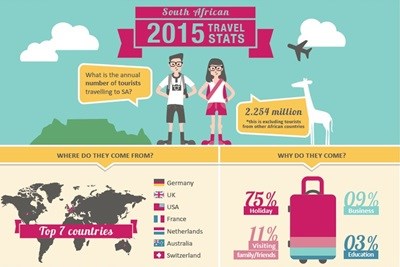
Top stories






More news







Logistics & Transport
Uganda plans new rail link to Tanzania for mineral export boost










Below are a few of the metrics we discovered and what they mean from an online-marketing perspective:

Around 2,254 million tourists visit South Africa each year, and this number grows when we include travellers from other African countries. While the current child-visa issues will no doubt affect this metric, it's still worth knowing that quite a considerable number of people visit our lovely country each year. As a travel service provider (whether you're in accommodation, car hire or the safari sector), it's up to you to ensure that you can be found online.
The top six countries that travel to South Africa are Germany, the UK, the US, France, the Netherlands, Australia and Switzerland. What's important to note from a marketing perspective is that these countries share certain characteristics:
As many as 75% of our visitors come to South Africa for a holiday, so the majority will be looking for accommodation, as well as information on things to do and see.
The 11% visiting family and friends, the 9% here on business and the 3% who come for educational purposes should also not be ignored: while these percentages may seem small, 3% of 2,2 million is still a lot of people (i.e. 66 000!)
The average tourist spends R1 189 a day, excluding accommodation and the cost of transport in getting here. This is the money they are spending on food, activities, attractions and events - not a small sum, even when compared to the cost of a basic cup of coffee in a country like Switzerland. At R75 per cup, that equates to 15 cups of top-notch brew a day.
The top six activity categories are:
From a content marketing point of view, this is valuable information as it points out where people are spending their money and the information they will be looking for during the planning phase of their trip.
47% rely on word-of-mouth referrals when researching trips;
29% trawl the Internet for information;
10% consult the media, such as the travel sections of newspapers and magazines (i.e. Getaway); and only...
14% make use of traditional travel agencies.
This offers some insight into where you should be advertising and/or offering PR content. It's also vital to ask guests for a review on your service. South Africans are still lagging behind when it comes to reviews; for some reason, the overriding fear is that they'll be negative. If a review is negative, it presents an opportunity for you to make a serious change or improvement to your tourism offering. And because a business is often judged by how it manages a bad review, you can actually score huge 'brownie points' by handling the situation in an insightful and polite manner.
33% book directly through vendor sites;
30% book through online travel agents;
22% book through traditional travel agents; and the remaining...
15% handle their own bookings by drawing up a unique package for themselves.
The differences here are not extensive, but it's worth noting that an increasing number of travellers to South Africa are booking directly through a service provider - that means you!
30% of the people visiting South Africa hire a car. This fact, in itself, is not surprising but if tourists are driving around, it means you can tailor your marketing messages around self-drive holidays - making your communication that much more relevant!
In a nutshell, the above all combines to show how essential it is to be online, offering interesting and relevant information about the service you're providing. Let's illustrate this with an example: if you own a guesthouse located on the Garden Route, your website should not only describe and show images of your attractively-decorated rooms and great views, but should also offer a blog that shares activities, events and attractions in your area. You can even offer suggested travel itineraries for those driving the Garden Route, with fun stops that only locals tend to know about. Touches like these will add immense value to your marketing message, meaning more appreciative clients and impressed fans.
Try to expand your digital reach by encouraging happy clients to leave online reviews and to stay in touch on social media platforms like Facebook, Instagram and Twitter. Of course, you'll still need to deliver from a customer service and value-adding perspective, but if potential customers can't find you on the web - based on a referral or a basic Google search - you could well have lost that business.
Download the 2015 South African Travel Stats infographic (Size: 248KB)
